
In May 2022, we conducted a poll of 450 working Britons to see how their mental health is faring in the current, post-pandemic, working environment. The ultimate goal of this poll was to gain a picture of how workers’ overall wellness is being supported by their employers, as well as the ways in which their mental state has evolved after returning to the office.
Like many of our other recent studies, we made sure to limit this poll to only UK office workers, as we believe that this group experienced some of the most dramatic changes to their daily routines and workflows throughout the pandemic. Having previously started the day with a commute to their former office space, the lockdowns linked to COVID-19 saw the vast majority of this group pivot to remote work for an extended period of time, swapping their office desk for their kitchen desk as they worked from home.
It was our intention to choose this segment of society, as they should be especially indicative of how the extreme swing in regular work environment can impact workers’ mental health and overall wellness. Additionally, we wanted to see how supported they feel in these regards when compared to pre-lockdown situations.
Below, you can find a summary of the results of our poll:
Mental Health & Returning to the Office
- 41.11% of office workers said that their mental health hadn’t changed after returning to the office
- 25.33%, of workers signalled that their mental health improved after returning to the office
- However, 22.89% of workers reported diminished mental health after returning to their physical workplaces
- 10.67% of respondents indicated they still haven’t returned to the office
Post-Pandemic Work-Life Balance
- 60.44% of polled office workers said they have better work-life balance now, when compared to before the pandemic.
- 21.56% of workers indicated they’ve felt no difference to their work-life balance
- 18% of the UK’s office workers feel that they’ve had a worse work-life balance since the pandemic
Access to Mental Health & Wellbeing Support
- Nearly half of employees, or 47.78%, indicated that there is accessible mental health and wellbeing support being provided by their employer
- 27.56% of office workers have stated that mental health and wellbeing support services are offered but are hard to access
- 15.78% of workers responded that they aren’t provided any mental health or wellness support by their employer
- 8.89% of workers were unsure if their employers provide access to mental health and wellness support services, or they haven’t sought them out
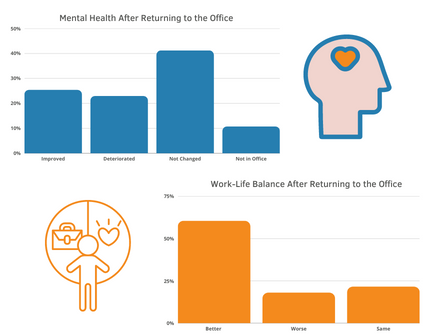
The current state of mental health and wellness support by UK businesses
Mental health and wellbeing have continued to serve as watershed topics of late, with the extended periods of isolation and lockdown seen throughout the pandemic serving to further drive investment by employers. With the worst of the pandemic now behind us, and the vast majority of white collar UK workers now back in the office in some capacity, ensuring that employees are in a good mental health space remains a chief concern for businesses looking to move forward.
UK businesses have broadly, to their credit, contributed positively to the new working landscape that has emerged after the pandemic. This has manifested through increased focus on the wellbeing of their employees, as well as ways to positively alter their work-life balance to limit burnout. Many employers are now adopting more human-centric working models and workplace environments in response to currently accepted best practices across multiple industries. Gone are the days of bleak cubicle-styled office spaces, instead replaced with hybrid facilities that encourage a mixture of in-person and remote work to maximise productivity, employee happiness, physical health and mitigate mental health issues.
So, in light of this changed world of work, we conducted this poll to generate more understanding around how the mental health and wellness needs of employees are currently being addressed in the workplace.
Read on for further insight into core results from our study.
Mental Health & Returning to the Office
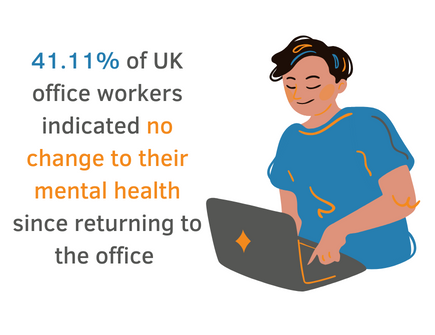
Mental health seems not to have changed for a significant proportion of UK office workers
The fact that 41.11% of respondents indicated no change in their mental health since returning to the office comes as somewhat of a surprise, especially when considering the major role that work environments and daily workflows play in the mental state of full-time workers. This result can be taken one of two ways. Firstly, that most office workers have been generally indifferent about their return to the office, seeing no noticeable issue with shifting back to the workplace after months of remote work. Or, secondly, that whatever the mental health status of these respondents prior to the ending of lockdowns, it hasn’t been altered for these workers after returning to the office.
It should be noted that signalling no change in your mental health doesn’t necessarily mean that there wasn’t as issue at the outset, making it difficult to draw insight about the role of in-person and remote work on mental health for the respondents who selected this answer.
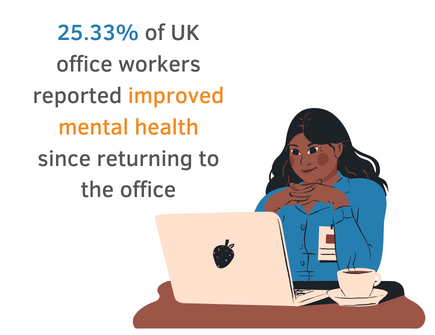
Over a quarter of UK’s office workers reported that their mental health had actually improved after coming back to in-office work
Despite the highly publicised shift in preference towards remote work that has been seen since the state of the pandemic, our previous study on hybrid working provided a fairly resounding argument stating that a mixture of in-office and remote work is the most desirable working model amongst UK office workers. So, it comes as no surprise that 25.33% of respondents reported their mental health improving since making a return to the office, at least for part of their working week.
Close to two years is a long time for workers to be isolated from their colleagues, especially considering that digital communications can never truly act as a satisfying substitute for the unique spark and depth of conversation that comes from face-to-face interaction. Even for the most introverted people, having a return to the normalcy provided by interacting with your colleagues in the flesh, engaging in your morning coffee run, or simply resuming your regular commute, would understandably provide a boost to the mental health of many office-based employees.
For many office workers across the globe, the pandemic served as an effective trial run to highlight the benefits and drawbacks of long-term remote work. Whilst a lot of people might’ve initially enjoyed the ability to wake up later, work in their pyjamas, and walk their pets during their lunch break, many began to equally miss the benefits provided by a physical workspace. Team lunches and Friday drinks were sorely missed, as was the spark provided by spontaneous banter across the office. As much as people might’ve been drawn to remote work to begin with, it appears that at least some form of in-person interaction is key to a significant proportion of UK office workers.
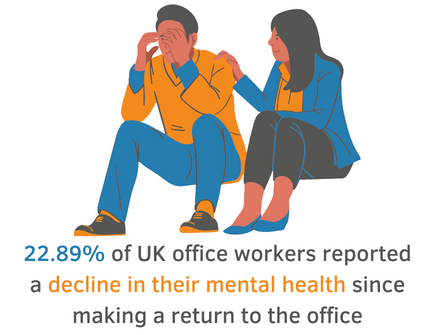
Over a fifth of office workers signalled that their mental health had deteriorated after returning to the office after lockdowns
This segment of respondents stands in stark contrast to those who indicated a soft spot for in-person work. This is likely due to these workers’ continued preference for remote work, and the heightened autonomy this working model affords. Reading between the lines, it can be inferred that this particular contingent from our poll didn’t have a choice about returning to the office, whether that be in a full-time or hybrid capacity. Where others might’ve felt energised by the ability to return to the office at their own leisure, this group of individuals likely saw a return as restrictive.
In addition, returning workers may feel worried that their workplaces may not have taken adequate health measures for resumption of in-office work, or at least not clearly communicated their heightened COVID-safe policies and practices. Many returning workers now expect, and justifiably so, certain workplace improvements – like better ventilation, PPE policies, and regular disinfection to ensure that chances for cross-infection are minimised – so workers can more easily rest assured that they won’t put their at-risk loved ones in additional danger.
Another contributing factor to these returning workers worsened mental health could be because their employer’s work-type policies are too rigid, not allowing for more flexible and hybrid schedules to accommodate competing life concerns. Despite the trials and tribulations apparent throughout the pandemic, the flexibility provided by remote work is understandably hard to relinquish after an extended period of time.
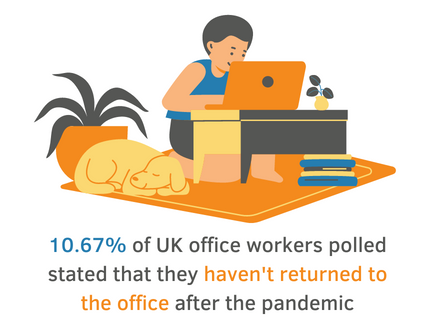
Over ten percent of UK’s office workers still haven’t returned to their workplaces after the ending of lockdowns
This figure correlates somewhat with our previous study on how Brits rated their return to the workplace – where 13.1% of the UK’s office workers indicated they hadn’t returned to the office as at May 2022. It’s not an insignificant figure, and indicates a strong holdout amongst the UK’s workforce when it comes to successfully maintaining their working preferences – despite many prominent industry heads pushing for a return to the traditional office.
The desire from companies to attract top talent back to the office has been well reported. Even with these efforts to entice workers with additional perks, more humanistic decor elements, and revamped working policies, it seems that a fairly stable contingent of the UK workforce are standing their ground – flexing their increased bargaining power to retain remote positions.
Post-Pandemic Work-Life Balance
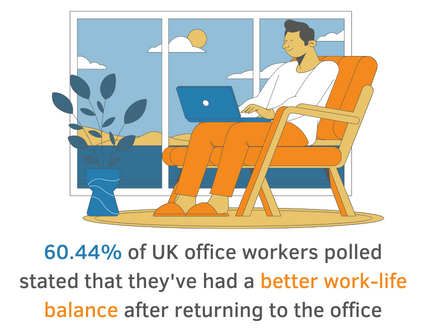
When queried about their post-pandemic work-life balances, 60.44% of office workers feel they’ve achieved better harmony
That such a clear majority of office working Britons feel they have a better work-life balance post-pandemic is a highly significant data point. It’s certainly a positive testament to employers’ post-lockdown transitions, as well as the way that they’ve managed their in-house employees’ return to work.
This could have been down to high-quality planning on the part of office-based employers in the UK – particularly businesses that implemented appropriate and thorough roadmaps out of lockdown. Adequate planning would have sufficiently accounted for their returning employees’ workplace requirements, thus facilitating a stable or improved work-life balance for workers.
Also, since it’s been shown from many studies – including our own into hybrid working – that the clear majority of UK workers prefer flexible work schedules, it can be assumed that the majority of office-based companies have been accommodating of their employees’ work-type preferences.
Work-life balance not only encompasses work volume, preferred working location and schedules, but holistically how workers’ wellbeing is being supported in healthily and productively fulfilling their personal and professional responsibilities.
Even as recently as 2018, research from online retailer Mahabis, collating data from the OECD and the International Labour Organisation, concluded that Britain had the worst work-life balance in all of Western Europe. The study ranked 20 industrialised nations on a number of different measures, including hours worked, maternity leave, annual paid leave and public holidays observed. When it came to UK workers lagging behind much of the world, the company’s former founder stated “a healthy happy workforce can drive productivity and creativity”‘ and “these figures reveal Brits are among the guiltiest of committing more time to their jobs rather than finding time to switch off.”
The unprecedented disruption caused by COVID-19 has also served to change up the work-life balance for harmony starved Brits. Tolerance for long work hours and low downtime has thankfully dropped away, to the point that the UK’s workers are reasserting their personal agency and demanding better balance. A mid-2021 study from Randstad of over 9,000 respondents showed that 65% of Brits now regard a sufficient work-life balance as their top driver when seeking out a new employer – even beating out whatever salary and benefits are on offer. This stands in contrast to our own study regarding workplace factors, which illustrated that monetary compensation still reigns supreme for UK office workers.
Having such a long and continuous period of remote work has obviously resulted in a shake-up of priorities for office working Brits. This is understandable considering what was, for the majority, such a drastic and long-term shift in work environment. The lack of commutes, increased time spent with loved ones, and the pandemic-imposed change in perspectives around health have definitely influenced prevailing sentiments surrounding what matters most. With the reopened working world being more accommodating of the worker, it’s encouraging to see that over 60% of British employees feel that they’ve achieved a generally improved work-life balance.
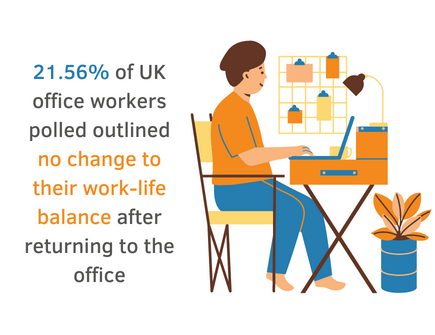
Over a fifth of our poll’s respondents said that they’ve experienced no difference in their overall work-life balance after COVID-19
That this proportion of Brits feel no difference in work-life balance is likely due to many of their employers adopting a ‘business as usual’ approach to post-lockdown emergence – whereby they wouldn’t have made any significant changes to how their workplaces operate. This is likely a foolhardy stance for businesses to take – especially given the increased bargaining power of the worker and the likelihood of a business’ competitors being more accommodating of changing employee demands.
There is probably some overlap here, too, with the proportion of workers who are still full-time remote – as they wouldn’t have any reason to signal a change.

A similar contingent of workers indicated that their work-life balance had actually suffered after returning to the office
This figure is likely representative of the contingent of UK office workers who firmly believe that remote working practices are core to a quality work-life balance. Similar to the 22.89% of respondents who indicated that their mental health has deteriorated since returning to the office, this group of individuals are clearly not interested in working in a traditional office environment. It’s likely that these workers’ priorities have shifted as a result of extended lockdowns, making them unsatisfied with their current work situation – even if it is the same as it was pre-pandemic. This would be especially understandable considering the sheer length of imposed remote work, and its effects in shuffling up workers’ expectations around acceptable work-life balance.
This group could also be indicative of the failure of some businesses to adequately transition their workers back into the office, whether that be by not accommodating post-pandemic needs or refusing to provide elements of flexibility. Business owners and managers, by and large, seem to have worked well to accommodate returning workers expectations, but evidently there are some who failed to change with the times.
Access to Mental Health & Wellbeing Support
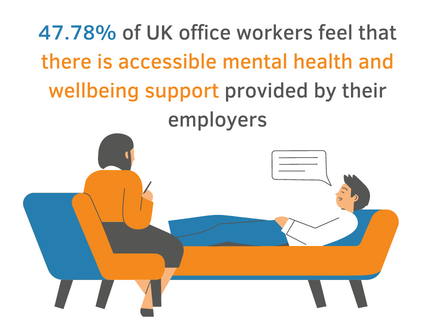
When asked about mental health and wellbeing support at work, almost half of UK’s office workers feel that there is accessible support
Despite some worrying findings surrounding declining mental health outcomes and poor work-life balance that have been outlined above, it’s heartening to find that almost half (47.78%) of respondents believe that their employer is providing accessible support services.
Workplace health and safety policies and procedures have evolved greatly over the past few decades, especially in regard to growing considerations around the mental state of workers. The COVID-19 pandemic served to hold a magnifying glass over global healthcare systems, with early focus being placed on the pressing physical health concerns of the virus and later emphasis being tied to the mental toll caused by the entire situation. Government and industry officials were seen broadcasting their worries about the mental health of isolated individuals, resulting in numerous businesses taking up the call to further expand their internal support services.
Whilst undoubtedly making up the largest proportion of respondents, the fact that less than half of UK office workers have outlined accessible mental health support is somewhat concerning. In an ideal world, this figure would be approaching 100%. However, large-scale progress can take time, especially in these areas of the workplace where outcomes are less tangible, measurable, and less obviously actionable. With roughly 1 in 4 people in the UK experiencing a mental health problem each year, it’s extremely important for businesses to provide the support employees need.

Over a quarter of British office workers have signalled that their employers do offer support services, but they’re too hard to access
Workplace support services should be set up to reach and help as many employees as possible, something that is clearly not occurring for the 27.56% of respondents who indicated that the support provided by their employer is hard to access. If attaining these services is too difficult, they may as well not exist for the employees who need them to combat mental health problems.
Hopefully it’s just a case that workplaces mismanaged the implementation of support services, rushing their rollout, or have struggled with heightening the scope of their already existing supports on the back of COVID. If it’s just a simple matter of removing barriers to access, encouraging their use, or better promoting support services amongst employees, these shortfalls can easily be resolved. The many organisations looking to support mental health education is commendable, however, it’s clear that employee wellbeing would be even more improved with additional promotion of avenues to aid, something that is all the more important in light of recent years’ global volatility. Employees should feel emboldened to pursue supports, not inhibited by difficulties accessing them.
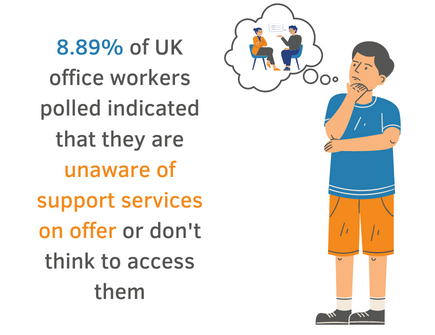
Close to 10% of UK office workers are unaware of support services offered, or simply chosen to never access them
Whilst this figure would ideally be sitting at zero, the fact that 8.89% of respondents are unaware or uninterested in the support services offered by employers isn’t necessarily a poor reflection on higher-ups. Instead, this figure could represent individuals who simply don’t require these types of services and have chosen to pay little attention, or those who opt to seek support outside of the workplace. In reality, it’s likely a combination of the above factors that influenced this result, and it doesn’t appear to be an area of massive concern that needs urgent addressing.
However, in light of the previous revelation of some workplace support services being viewed as too difficult to access, employers should take this as further evidence that mental health and wellbeing support needs to be better promoted. It would be a good sign if workers who have no need for wellbeing and mental health support are eventually thoroughly aware of what services are on offer, and how to seek them out. This is especially important to hedge against the likelihood that things inevitably change for some individuals. Workers who are currently faring well may eventually end up needing support for a mental health condition in the future. Most individuals experience work related stress in some form throughout their career, something that can eventually impact their home life and lead to mental health conditions if left unchecked. Simple promotion of the physical health impacts that increased stress can have on the body, as well as reasonable adjustments that can be made to limit stress and anxiety, could potentially help employees identify if they’re struggling with their own mental health. If they’re well-informed on how to seek these services when they eventually need them, then it can only provide benefit for both these workers, and the businesses who rely upon them.
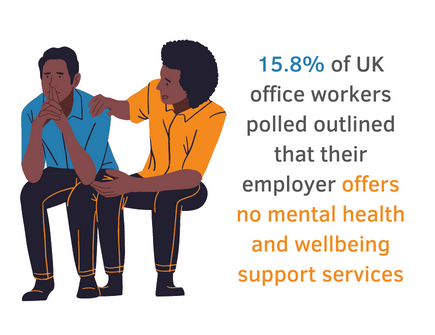
On the back of the prior finding, a significant proportion of the UK’s office workers have indicated that their employer offers no support services
This is quite a stunning condemnation on the broader state of mental health and wellness support services being provided by UK employers. Although 15.8% might seem like a distinct minority, the implications for this figure even existing at all are startling.
Post-pandemic media reporting has regularly focused on a renewed stance adopted by countless companies which champions and supports the mental health and wellness of their employees, and not just in the sense of legislated WHS (workplace health and safety) policies and outcomes. A layperson would expect that the vast majority of workplaces would have been successfully implementing these support services, to have shaped popular narrative so resoundingly. But, with close to 16% of workers saying that their employer offers no support services, accepted wellness consensus has obviously not fully filtered down to action everywhere.
It’s certainly in employers’ best interests to ensure they have adequate support services set up for their employees. Commenting on their report release in early 2022, Deloitte’s director Elizabeth Hampson revealed that poor mental health costs UK employers up to £56 billion a year, an increase by 25% on 2019’s figures. Extrapolating data from Deloitte’s report, it can be inferred that for every £1 invested in worker wellbeing, employers can expect a return of £5.30.
Further, a report out of McKinsey in July 2021 indicated that mental health for 1 in 3 people was negatively impacted by their return to the office. This report, whilst not directly aligning with our findings that indicated just over 1 in 5 people experiencing a decline in their mental state, should signal to employers the importance of actively taking steps to reduce these figures and improve outcomes. Poor mental health outcomes at work have been a strong driver for the Great Resignation, making it vital for employers to be proactive and on the front foot when ensuring that current and prospective employees’ mental wellbeing is adequately supported – lest these workers easily jump ship to better jobs, or change industries entirely to chase a better work-life balance.

Takeaways
Signs are promising, for office workers at least, that UK employers are doing a passable job of providing support for their mental health and wellbeing. However, we’ve unearthed significant evidence that broad, cross-industry consensus on these topics isn’t quite matching up with the actual quality and accessibility of support services.
It’s at least evident that the majority of employers have indeed developed adequate employee support services, but many haven’t sufficiently informed their workers about how to attain them, or they’re viewed as too hard to access. Employees in need shouldn’t have to jump through various hoops to attain support, especially if they’re in dire need; support services should rather be easily accessed and their use readily encouraged.
However, even despite these negative findings, there are resounding positives to take away from our study. Especially notable is that a clear majority of office workers feel that they have a better work-life balance since making their return to the office. In addition, the fact that nearly half of respondents indicated that they have ready access to support services is something to celebrate. That there is still so much lag on the ground in some actual workplaces, however, compared to popular business sentiment, indicates there are still some ways to go.
Ready and widespread adoption of newly established best practices around employee mental health and wellbeing is a great thing. However, actual effective development and implementation of support services is obviously lagging behind these progressive wellness attitudes that are on display. Businesses in the UK still have some distance to close before accepted best practice aligns with the real-world outcomes but, based on our poll, they’ve at least shown that they’re on the right track.
Looking for more articles?
For more deep dives into workplace statistics and general office insights, you can visit:
Do Employees Feel Supported by Their Managers After the Pandemic? (2022 Poll)
UK Office Workers Polled: Characteristics of a Good Manager
London Office Market Sees Highest Level of Occupier Activity Since Before the Pandemic
How to Deal with the Stress of Returning to the Office after a Long Layoff
10 Ways to Improve Office Morale
An Overview of Coworking Spaces in London
How to Value a Commercial Property and Determine Rent in London
